Most Funeral Homes Don't Know How To Bury Muslims. These Women Want To Change That.
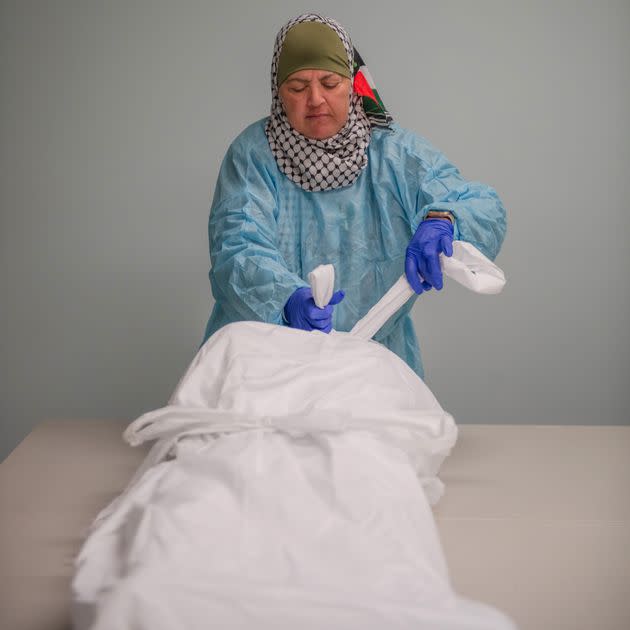
Ida Khalil demonstrates how to wash and prepare a body for burial at Beit Anan Community Center in Paterson, New Jersey, Oct. 22.
PATERSON, N.J. — More than a dozen women watch closely as Ida Khalil measures the length of the mannequin lying on the white table in front of her, stretching the palm of her hand and moving up from the figure’s toes to its head.
She then measures and cuts the white shroud, the garment in which Muslims are wrapped when they are buried — three pieces of cloth for men and five for women. Muslims traditionally aren’t buried in caskets, a practice connected to the belief that everyone is equal in death and no one takes along any of the possessions, status or wealth they may have accumulated in life.
Khalil’s voice, confident and clear, reverberates in the room as she explains the rituals of how to wash and wrap a body according to the Islamic tradition. She wears blue medical gloves and a medical apron over her long black abaya, a loose garment worn by Muslim women, that she paired with a keffiyeh-print hijab. Behind her are the Palestinian and American flags, representing the large Palestinian American community in the town.
The women in the audience tilt their heads with Khalil’s every move, some taking detailed notes, others recording the demonstration on their phones. Some of the women came alone, while others came in pairs, including mothers and daughters. The women ― some in their early 20s, others in their 80s, and still others of every age in between ― sit in neat rows of folding chairs at this cultural center, their jackets hanging off the backs of seats. The sun sets, and a chilly fall wind hits the doors.
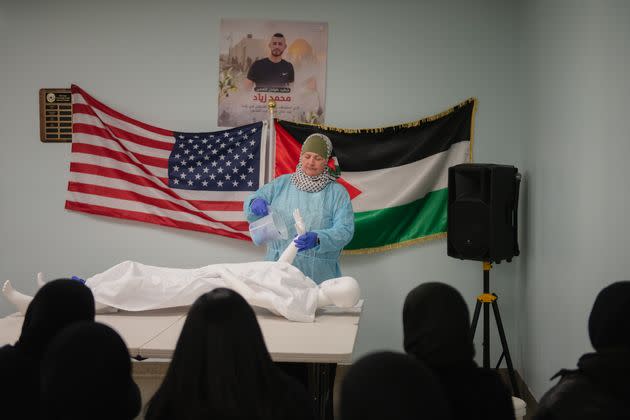
Khalil giving a demonstration at Beit Anan Community Center, Oct. 22.
Khalil is here because she believes it’s critical for the next generation of Muslim women to learn how to wash bodies. Otherwise, she worries, the tradition may be forgotten. In Islam, death is seen not as an end but rather as a transition from one lifetime to another. It’s not a taboo subject, and Muslims are encouraged to prepare for death to come at any moment, including by learning the related traditions, rituals and spiritual elements through the Islamic faith.
Despite this, many women in the U.S. are too afraid of touching a body to learn how to prepare for their loved ones’ deaths until it’s too late, Khalil said.
“They don’t get that this is incredibly important,” she told HuffPost.
‘You’re Putting Them To Peace’
Islam, like many other religions, sets out a specific process for what should happen to a person’s body after they die. The body must be washed and not embalmed, then buried quickly, usually within 24 hours.
Men are usually washed by men, and women by women. There are a few exceptions made for relatives such as parents and children. The Islamic faith outlines the protocols for preparing the body, including washing it (starting with the right side), braiding the hair, perfuming the body and wrapping it in cotton.

Audience members observe Khalil's demonstration.
Above all, there is an emphasis on dignifying the deceased. Those who wash are forbidden from relating the details of a body, and the process is meant to occur in silence. Muslims believe that washing, burying and praying for the dead are a collective duty. When a member of the community passes, all are encouraged to participate in funeral prayers and send condolences to the family.
Khalil, now 57, first learned to wash a body when she was 44.
“I said fine, let me take the class. But I’ll never do this. I’m afraid of dead people,” she said, recalling when two women came to the mosque she attended to teach others how to carry out the process.
A few months later, Khalil’s mother reached out. Her sister-in-law had died, and she wanted Khalil to wash her.
Khalil was hesitant, but she didn’t want to reject her mother’s request. She showed up to the mosque, accompanied by two other women. The room was silent and Khalil found herself washing her aunt’s body without concern. She thought she’d have trouble sleeping that night, but she slept well, knowing she could honor her mother and aunt.
Thirteen years later, Khalil has washed more than a hundred women at three mosques across New Jersey.
“I used to be afraid of dead people,” she said. “Now I could sleep next to dead people.”
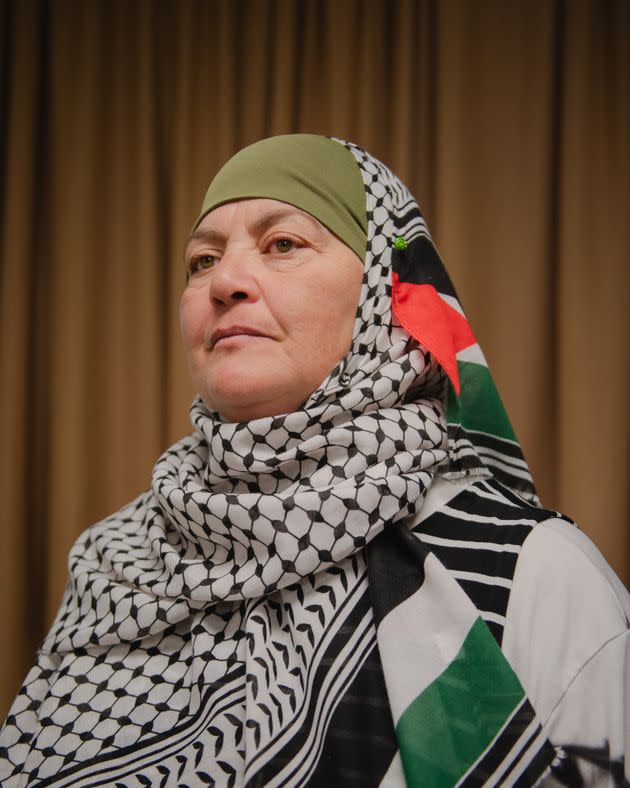
Khalil teaches other Muslim women how to wash and prepare a body for burial.
Some washes are harder than others. Khalil recalls washing and preparing the body of a 5-month-old fetus that did not make it to term. She also recalls washing the body of a domestic violence victim who was punctured with stab wounds.
At the cultural center where Khalil taught her class, she demonstrated the Islamic pre-ritual wash conducted before prayers, washing between the mannequin’s fingers, face and feet up to the ankles. She used warm water, as she always does. She told her audience that she tells the families of the deceased to bring their loved one’s favorite soaps and shampoos.
Khalil told the women in the class to think about themselves and treat the body as they would want to be treated.
“It’s their last bath,” she told her audience. “Picture yourself.”
Some women asked if nail polish and piercings should be removed. Yes, Khalil said. The majority of women said it was their first time taking Khalil’s class, though some said they’d taken one before.
Naemeh Asfour, 25, attended Khalil’s class with her mother. It was her first time. Asfour and her mother had promised that whoever died first would wash the other.
“Everyone’s a little scared seeing someone dead, or seeing someone you love in that position,” she said. “But in reality, it’s very peaceful when you think about it. You’re giving someone that final bath and you’re putting them to peace.”
‘We’ll Have To Step Up’
In Muslim-majority countries, funeral homes abide by the burial customs of the faith, a process that emphasizes minimalism. After the bodies are washed and wrapped with the white shroud, the deceased are buried facing toward Mecca, the city Muslims face to pray.
But many funeral homes in the U.S. aren’t aware of Islamic traditions, or well equipped to carry them out.
Ramla Shaikh recognized this immediately after moving to the U.S. in 1987. She noticed that the majority of funeral homes embalmed their dead ― the process of preserving a corpse by treating it with chemicals, which is forbidden by the Islamic faith ― or cremated them.
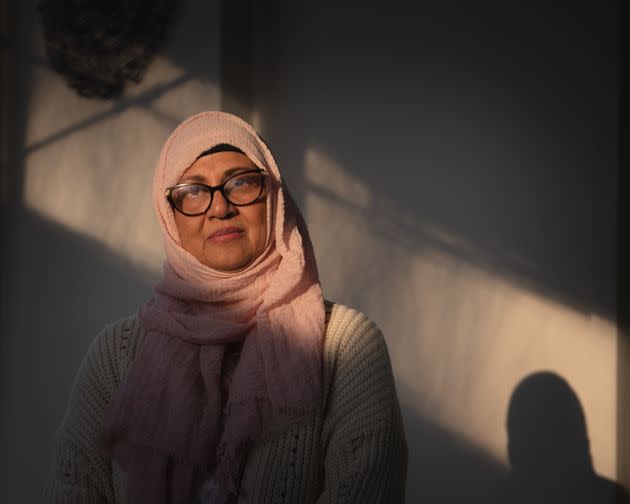
Ramla Shaikh works with a local funeral home in Avon, Connecticut, to assist with Muslim burials.
So Shaikh, who lives in Avon, Connecticut, now collaborates with a local funeral home when someone in the area’s Muslim community dies. If the body of a Muslim person is brought to the funeral home, they call Shaikh to make sure a Muslim, sometimes Shaikh herself, washes the body.
Shaikh has also negotiated prices with the funeral home on the mosque’s behalf. Traditional services, which include embalming and holding a body for an extended period of time, cost approximately $10,000. But since Muslims prohibit embalming and bury their dead within 24 hours of their passing, Shaikh was able to reduce that cost to just $3,000. (The process is often paid for by social services in Muslim-majority countries, but in the U.S., people from a community band together to cover the costs. Shaikh’s mosque will help families cover expenses if they can’t afford them.)
“If somebody passes away in this country, a Muslim woman or a man, there isn’t a service or aren’t any professionals who can do it here like for the Christians, Jews, or other religions,” she said. “We don’t have that, so we’ll have to step up and do it for our own.”
Shaikh has created a WhatsApp group to coordinate whenever someone in the community dies. She’s been able to help people all over the state.
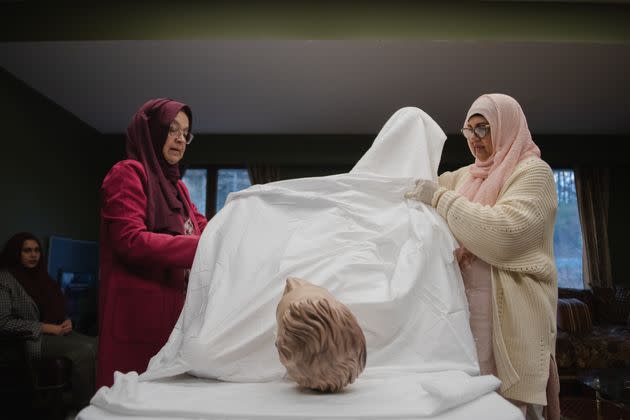
Shaikh, at right, and another woman demonstrate the preparation of a body for burial.
Shaikh first washed a body in 2004, when her mother died. She has since washed many more, including those of her mother-in-law and friends of friends, and she persuades other women to get involved with the practice.
“I needed to teach other people so when it comes my time, and I go, somebody will be there to wash me,” she said.
Safwan Shaikh ― the imam at Ramla’s mosque, and no relation to her ― said his community is grateful to have Ramla to streamline the washing and shrouding for their members. Not all mosques are as organized, and the imam said those mosque administrators need to uphold their obligations to the community. In addition to offering religious guidance to the body washers, Safwan ensures that families of the deceased have access to the mosque’s resources, including a memorial service and assistance with expenses.
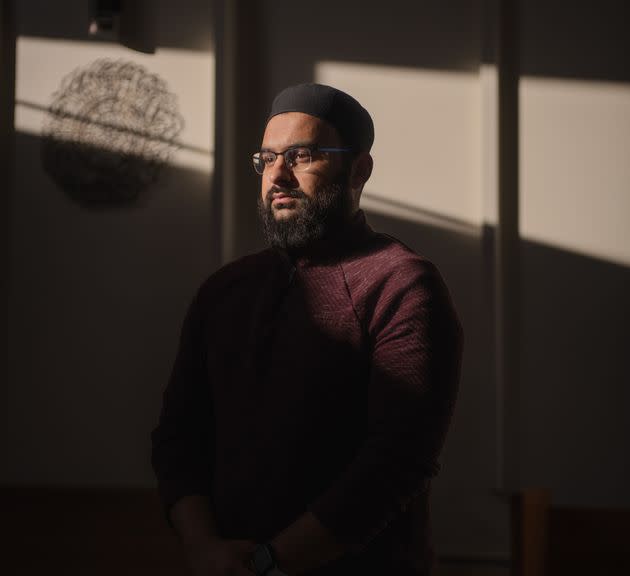
Safwan Shaikh, an imam, works to ensure that families of Muslims who pass away have access to his mosque’s resources.
“It’s something that’s a necessity,” Safwan said, “and I can’t imagine the community not having these for both men and women.”
The mosque had a women’s washing team, headed by Ramla, before there was one for men.
“Muslim women have a lot of rights and responsibilities,” she said. “They are portrayed in front of the world that they are oppressed, but they are leaders in every way.”
Back in Paterson, Khalil hasn’t taken a penny for her work. She never plans to.
“I would do it [for free], even if I’m poor and I have nothing to eat and I have to beg,” Khalil said.
She said the experience has been life-changing. It’s made her reflect on the shortness of life and her purpose in this world. Her demeanor fluctuates between patience and a somber acceptance, as she’s no longer stressing over the small mishaps in life.
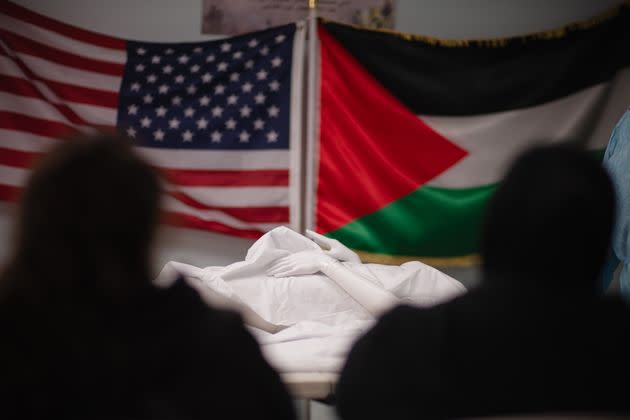
A wrapped mannequin on a table during a demonstration by Khalil at Beit Anan Community Center.
She’s silent when she attends funerals and burials, and demands the same from those around her. A few weeks ago, she scolded funeral attendees who were being disruptive and making unnecessary small talk. Respecting the deceased means acknowledging what is to come, for her and for everyone else in that room.
“We’re all going to be in this position,” Khalil said. “It’s a part of life.”
This story was produced with support from the Round Earth Media program of the International Women’s Media Foundation.

